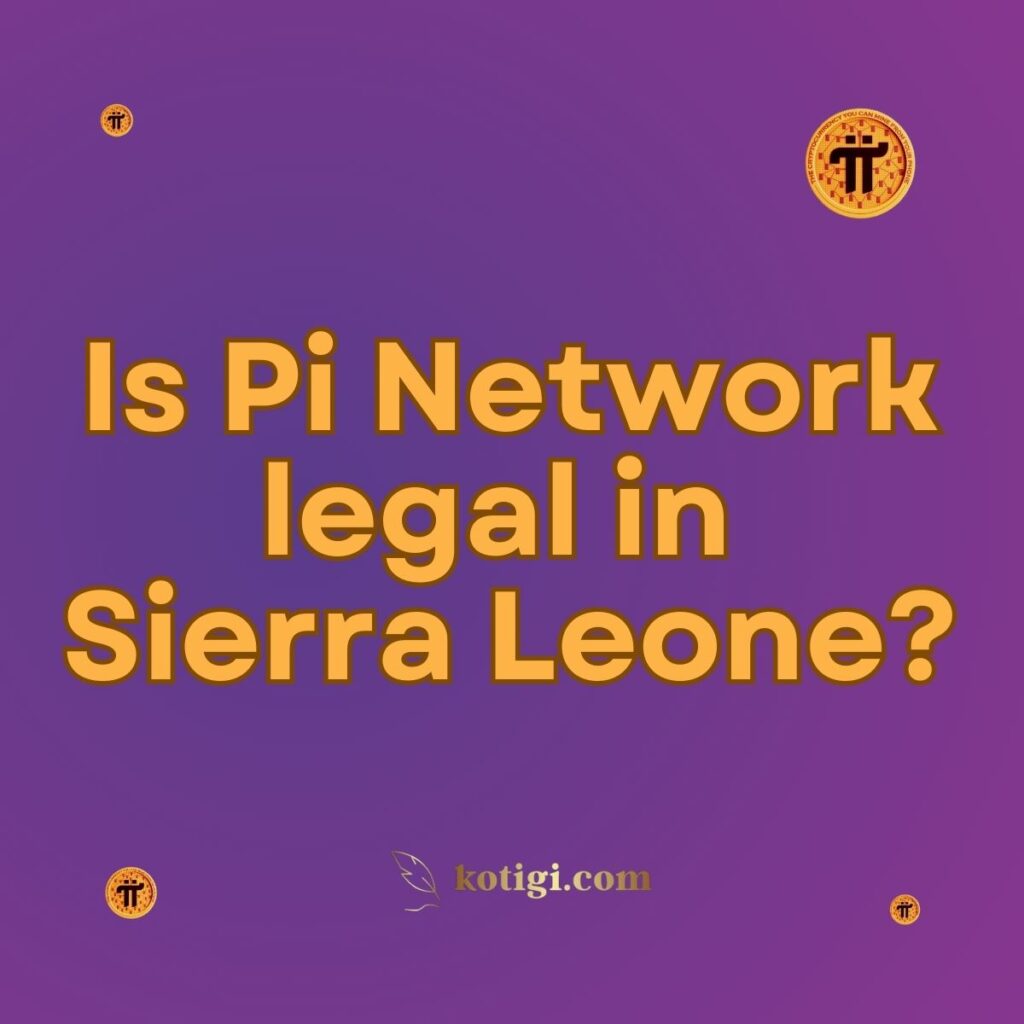
Is Pi Network legal in Sierra Leone?
The legality of Pi Network in Sierra Leone is currently unclear, as the country has not established specific regulations for cryptocurrencies. While there are no laws explicitly banning Pi Network, the Bank of Sierra Leone has expressed caution about the risks associated with digital currencies. Users in Sierra Leone should proceed carefully and stay informed about any potential regulatory developments regarding cryptocurrencies.
Introduction
As the Pi Network continues to gain traction globally, users in Sierra Leone may wonder about its legality and whether they can participate in the network without running afoul of local laws. While the adoption of cryptocurrencies is growing worldwide, Sierra Leone has been relatively slow in developing a formal regulatory framework for digital currencies. This article will explore the current legal standing of Pi Network in Sierra Leone, how it aligns with the country’s financial regulations, and what users should consider before engaging with the platform.
1. Cryptocurrency Regulations in Sierra Leone
1.1 Current Legal Framework for Cryptocurrencies
Sierra Leone, like many other developing nations, does not have a well-established legal framework for cryptocurrencies. The country’s financial regulatory body, the Bank of Sierra Leone, has yet to issue specific laws or guidelines governing the use, trade, or mining of digital currencies. This means that platforms like Pi Network are operating in a gray area. Although they are not explicitly banned, they are not regulated either, leaving users to navigate potential risks on their own.
1.2 Bank of Sierra Leone’s Stance on Cryptocurrencies
The Bank of Sierra Leone has voiced concerns over the potential risks associated with cryptocurrencies, including volatility, lack of consumer protection, and the potential for fraud. While these concerns have not translated into a ban on platforms like Pi Network, they indicate that the government is cautious about fully embracing digital currencies. Users engaging with Pi Network in Sierra Leone should be aware that there are no specific protections in place, and they could face challenges if the platform encounters legal or regulatory hurdles in the future.
1.3 Absence of Formal Regulation
As it stands, Sierra Leone does not regulate cryptocurrency platforms such as Pi Network. The absence of formal legislation means that Pi Network can operate in Sierra Leone, but the lack of legal clarity presents risks. Without clear regulations, users may find themselves exposed to scams or other issues, with limited recourse for recovering lost funds or addressing disputes.
2. Compliance with Financial Laws in Sierra Leone
2.1 Anti-Money Laundering (AML) Regulations
While Sierra Leone does not have specific laws addressing cryptocurrencies, the country has implemented Anti-Money Laundering (AML) regulations designed to prevent illicit financial activities. Pi Network does not currently support trading or monetary transactions involving its tokens, but any future changes to the platform that allow for Pi token trading could trigger the need for compliance with AML laws. Both Pi Network and its users may need to adhere to these regulations to ensure they are not violating Sierra Leone’s financial laws.
2.2 Potential Future Regulations
Given the global trend toward regulating cryptocurrencies, it is possible that Sierra Leone will introduce specific laws to govern digital currencies in the future. These laws could impact how Pi Network operates within the country and what users are legally allowed to do with Pi tokens. If such regulations are enacted, users in Sierra Leone will need to stay updated to ensure they remain compliant with any new rules or restrictions.
2.3 Lack of Consumer Protection
One of the significant risks associated with participating in an unregulated platform like Pi Network in Sierra Leone is the lack of consumer protection. Since the government has not established legal safeguards for cryptocurrency users, individuals engaging with Pi Network may have no recourse in the event of fraud, theft, or other issues. This highlights the importance of exercising caution when using Pi Network in an unregulated environment.
3. Risks and Opportunities for Pi Network Users in Sierra Leone
3.1 Regulatory Uncertainty
The regulatory uncertainty surrounding Pi Network in Sierra Leone presents a significant risk for users. While there are currently no laws prohibiting the use of Pi Network, the government could introduce new regulations at any time that might restrict or ban the platform. Users should be prepared for the possibility of future regulatory changes that could impact their ability to mine, trade, or use Pi tokens.
3.2 Opportunities in a Growing Digital Economy
Despite the risks, Pi Network presents an opportunity for users in Sierra Leone to engage with the digital economy in a relatively low-cost and accessible way. The platform’s mobile-based mining model allows users to participate in cryptocurrency mining without needing expensive hardware or technical expertise. This could provide an entry point for Sierra Leoneans who are interested in blockchain technology but have limited financial resources.
3.3 Volatility and Market Risks
As with all cryptocurrencies, Pi tokens will likely experience significant price volatility once they become tradable. Users in Sierra Leone should be aware of the risks associated with such volatility, particularly in an unregulated market. The lack of government oversight may also make it difficult for users to manage these risks effectively, increasing the potential for financial losses.
4. The Role of Pi Network in Sierra Leone’s Financial Landscape
4.1 Supporting Financial Inclusion
Sierra Leone has a large unbanked population, with many people lacking access to traditional financial services. Pi Network’s mobile-first approach to cryptocurrency mining could offer a way for these individuals to participate in the digital economy. By allowing users to mine and hold Pi tokens using only their smartphones, Pi Network may help to promote financial inclusion in a country where access to banking services is limited.
4.2 Potential for Economic Growth
Cryptocurrencies like Pi Network could play a role in driving economic growth in Sierra Leone, particularly as the country seeks to modernize its financial infrastructure. By providing a platform for users to engage with digital assets, Pi Network could help to spur innovation and entrepreneurship in the country’s digital economy. However, this potential will depend largely on the regulatory environment and how the government chooses to address the challenges posed by cryptocurrencies.
4.3 Challenges of Navigating Regulatory Changes
For Pi Network to fully integrate into Sierra Leone’s financial system, it will need to navigate the challenges posed by regulatory changes. The government may eventually decide to implement laws governing the use of cryptocurrencies, which could affect how Pi Network operates in the country. Users should stay informed about potential regulatory updates to ensure that they remain compliant with any new rules.
5. How Pi Network Can Adapt to the Regulatory Environment in Sierra Leone
5.1 Staying Informed about Regulatory Developments
For users in Sierra Leone, staying informed about regulatory developments is crucial. As the government continues to assess the role of cryptocurrencies in the economy, any new laws or guidelines could have a direct impact on Pi Network’s operations. By keeping up with these developments, users can ensure that they remain compliant with local laws and avoid potential legal issues.
5.2 Collaborating with Regulatory Authorities
Pi Network could benefit from collaborating with regulatory authorities in Sierra Leone to ensure that it operates within legal boundaries. By engaging with policymakers early on, the platform may be able to address concerns about consumer protection and financial stability. This proactive approach could help Pi Network gain wider acceptance in Sierra Leone and navigate any future regulatory changes more smoothly.
5.3 Educating Users on Regulatory Compliance
As the platform grows, Pi Network may need to provide resources to help users in Sierra Leone navigate the legal landscape. This could include educational materials on AML compliance, security best practices, and how to safely use Pi tokens once they become tradable. By educating users, Pi Network can help ensure that its community remains compliant with local laws and avoids potential legal pitfalls.
Conclusion
While Pi Network is not explicitly banned in Sierra Leone, the lack of specific regulations governing cryptocurrencies means that users are operating in an uncertain legal environment. The Bank of Sierra Leone has expressed concerns about the risks associated with digital currencies, but there are no laws currently preventing users from participating in Pi Network. As the government continues to evaluate the role of cryptocurrencies in the country, it is possible that new regulations could be introduced in the future. Users should stay informed and exercise caution when engaging with Pi Network in Sierra Leone.
Key Takeaways
- Pi Network is not currently banned in Sierra Leone, but its legal status is uncertain due to the lack of specific regulations governing cryptocurrencies.
- The Bank of Sierra Leone has issued warnings about the risks associated with digital currencies, including fraud, volatility, and the absence of consumer protection.
- Users in Sierra Leone face regulatory uncertainty, as the government may introduce new laws governing cryptocurrencies in the future.
- Pi Network presents opportunities for financial inclusion, particularly for the unbanked population, but users should be aware of the risks associated with participating in an unregulated platform.
- Staying informed and educated about potential regulatory changes is essential for users in Sierra Leone to navigate the legal landscape and mitigate risks when engaging with Pi Network.





